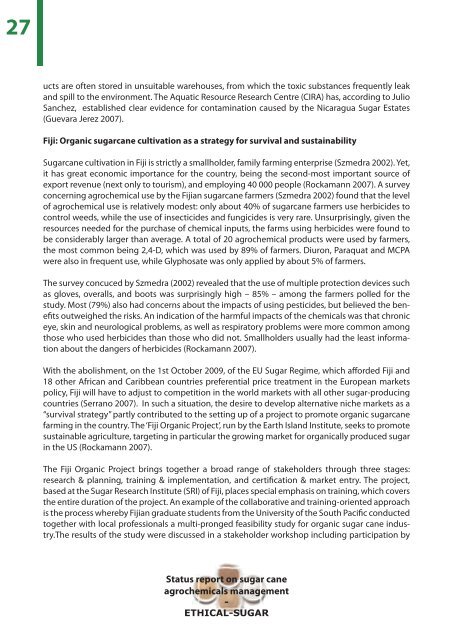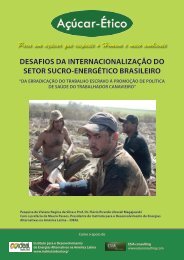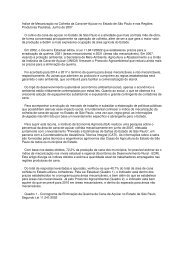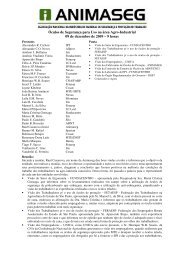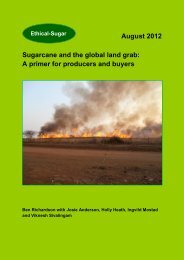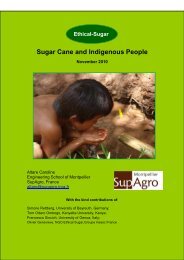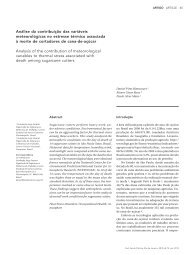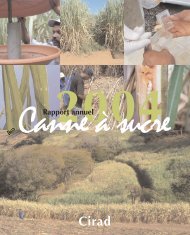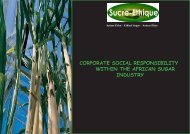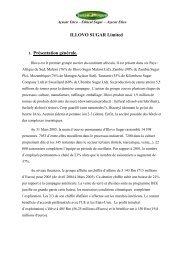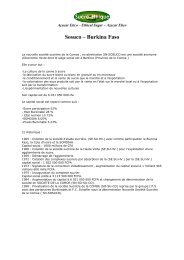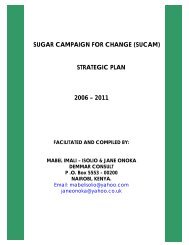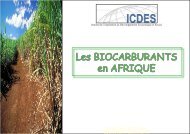Status report on sugar cane agrochemicals ... - Sucre Ethique
Status report on sugar cane agrochemicals ... - Sucre Ethique
Status report on sugar cane agrochemicals ... - Sucre Ethique
Create successful ePaper yourself
Turn your PDF publications into a flip-book with our unique Google optimized e-Paper software.
27<br />
ucts are often stored in unsuitable warehouses, from which the toxic substances frequently leak<br />
and spill to the envir<strong>on</strong>ment. The Aquatic Resource Research Centre (CIRA) has, according to Julio<br />
Sanchez, established clear evidence for c<strong>on</strong>taminati<strong>on</strong> caused by the Nicaragua Sugar Estates<br />
(Guevara Jerez 2007).<br />
Fiji: Organic <strong>sugar</strong><strong>cane</strong> cultivati<strong>on</strong> as a strategy for survival and sustainability<br />
Sugar<strong>cane</strong> cultivati<strong>on</strong> in Fiji is strictly a smallholder, family farming enterprise (Szmedra 2002). Yet,<br />
it has great ec<strong>on</strong>omic importance for the country, being the sec<strong>on</strong>d-most important source of<br />
export revenue (next <strong>on</strong>ly to tourism), and employing 40 000 people (Rockamann 2007). A survey<br />
c<strong>on</strong>cerning agrochemical use by the Fijian <strong>sugar</strong><strong>cane</strong> farmers (Szmedra 2002) found that the level<br />
of agrochemical use is relatively modest: <strong>on</strong>ly about 40% of <strong>sugar</strong><strong>cane</strong> farmers use herbicides to<br />
c<strong>on</strong>trol weeds, while the use of insecticides and fungicides is very rare. Unsurprisingly, given the<br />
resources needed for the purchase of chemical inputs, the farms using herbicides were found to<br />
be c<strong>on</strong>siderably larger than average. A total of 20 agrochemical products were used by farmers,<br />
the most comm<strong>on</strong> being 2,4-D, which was used by 89% of farmers. Diur<strong>on</strong>, Paraquat and MCPA<br />
were also in frequent use, while Glyphosate was <strong>on</strong>ly applied by about 5% of farmers.<br />
The survey c<strong>on</strong>cuced by Szmedra (2002) revealed that the use of multiple protecti<strong>on</strong> devices such<br />
as gloves, overalls, and boots was surprisingly high – 85% – am<strong>on</strong>g the farmers polled for the<br />
study. Most (79%) also had c<strong>on</strong>cerns about the impacts of using pesticides, but believed the bene�<br />
ts outweighed the risks. An indicati<strong>on</strong> of the harmful impacts of the chemicals was that chr<strong>on</strong>ic<br />
eye, skin and neurological problems, as well as respiratory problems were more comm<strong>on</strong> am<strong>on</strong>g<br />
those who used herbicides than those who did not. Smallholders usually had the least informati<strong>on</strong><br />
about the dangers of herbicides (Rockamann 2007).<br />
With the abolishment, <strong>on</strong> the 1st October 2009, of the EU Sugar Regime, which a� orded Fiji and<br />
18 other African and Caribbean countries preferential price treatment in the European markets<br />
policy, Fiji will have to adjust to competiti<strong>on</strong> in the world markets with all other <strong>sugar</strong>-producing<br />
countries (Serrano 2007). In such a situati<strong>on</strong>, the desire to develop alternative niche markets as a<br />
“survival strategy” partly c<strong>on</strong>tributed to the setting up of a project to promote organic <strong>sugar</strong><strong>cane</strong><br />
farming in the country. The ‘Fiji Organic Project’, run by the Earth Island Institute, seeks to promote<br />
sustainable agriculture, targeting in particular the growing market for organically produced <strong>sugar</strong><br />
in the US (Rockamann 2007).<br />
The Fiji Organic Project brings together a broad range of stakeholders through three stages:<br />
research & planning, training & implementati<strong>on</strong>, and certi� cati<strong>on</strong> & market entry. The project,<br />
based at the Sugar Research Institute (SRI) of Fiji, places special emphasis <strong>on</strong> training, which covers<br />
the entire durati<strong>on</strong> of the project. An example of the collaborative and training-oriented approach<br />
is the process whereby Fijian graduate students from the University of the South Paci� c c<strong>on</strong>ducted<br />
together with local professi<strong>on</strong>als a multi-pr<strong>on</strong>ged feasibility study for organic <strong>sugar</strong> <strong>cane</strong> industry.The<br />
results of the study were discussed in a stakeholder workshop including participati<strong>on</strong> by<br />
<str<strong>on</strong>g>Status</str<strong>on</strong>g> <str<strong>on</strong>g>report</str<strong>on</strong>g> <strong>on</strong> <strong>sugar</strong> <strong>cane</strong><br />
<strong>agrochemicals</strong> management<br />
-<br />
ETHICAL-SUGAR


